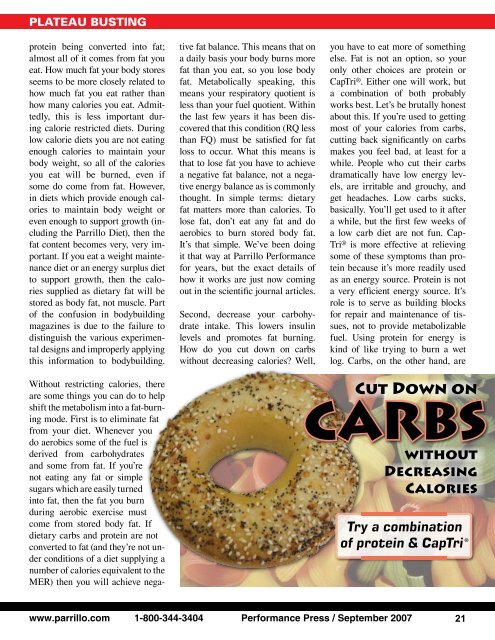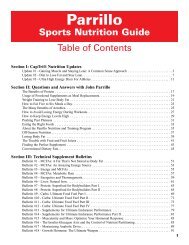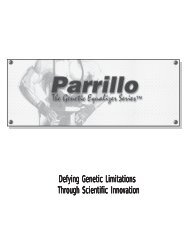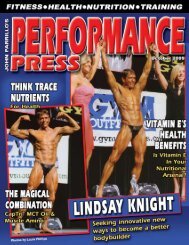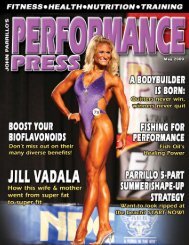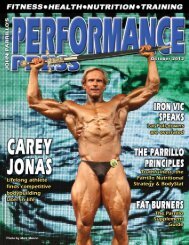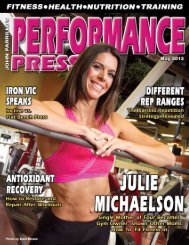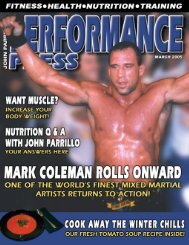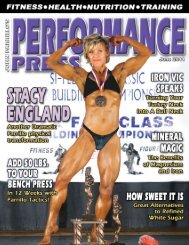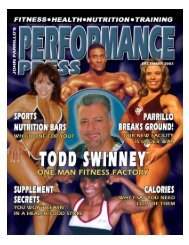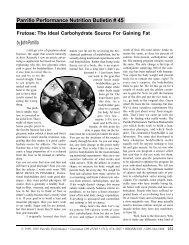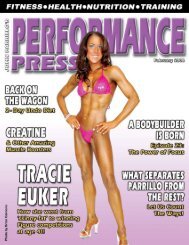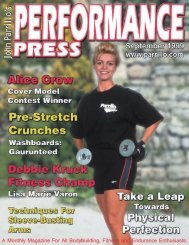Performance Press / September 2007 - Parrillo Performance
Performance Press / September 2007 - Parrillo Performance
Performance Press / September 2007 - Parrillo Performance
Create successful ePaper yourself
Turn your PDF publications into a flip-book with our unique Google optimized e-Paper software.
PLATEAU BUSTING<br />
protein being converted into fat;<br />
almost all of it comes from fat you<br />
eat. How much fat your body stores<br />
seems to be more closely related to<br />
how much fat you eat rather than<br />
how many calories you eat. Admittedly,<br />
this is less important during<br />
calorie restricted diets. During<br />
low calorie diets you are not eating<br />
enough calories to maintain your<br />
body weight, so all of the calories<br />
you eat will be burned, even if<br />
some do come from fat. However,<br />
in diets which provide enough calories<br />
to maintain body weight or<br />
even enough to support growth (including<br />
the <strong>Parrillo</strong> Diet), then the<br />
fat content becomes very, very important.<br />
If you eat a weight maintenance<br />
diet or an energy surplus diet<br />
to support growth, then the calories<br />
supplied as dietary fat will be<br />
stored as body fat, not muscle. Part<br />
of the confusion in bodybuilding<br />
magazines is due to the failure to<br />
distinguish the various experimental<br />
designs and improperly applying<br />
this information to bodybuilding.<br />
Without restricting calories, there<br />
are some things you can do to help<br />
shift the metabolism into a fat-burning<br />
mode. First is to eliminate fat<br />
from your diet. Whenever you<br />
do aerobics some of the fuel is<br />
derived from carbohydrates<br />
and some from fat. If you’re<br />
not eating any fat or simple<br />
sugars which are easily turned<br />
into fat, then the fat you burn<br />
during aerobic exercise must<br />
come from stored body fat. If<br />
dietary carbs and protein are not<br />
converted to fat (and they’re not under<br />
conditions of a diet supplying a<br />
number of calories equivalent to the<br />
MER) then you will achieve negative<br />
fat balance. This means that on<br />
a daily basis your body burns more<br />
fat than you eat, so you lose body<br />
fat. Metabolically speaking, this<br />
means your respiratory quotient is<br />
less than your fuel quotient. Within<br />
the last few years it has been discovered<br />
that this condition (RQ less<br />
than FQ) must be satisfied for fat<br />
loss to occur. What this means is<br />
that to lose fat you have to achieve<br />
a negative fat balance, not a negative<br />
energy balance as is commonly<br />
thought. In simple terms: dietary<br />
fat matters more than calories. To<br />
lose fat, don’t eat any fat and do<br />
aerobics to burn stored body fat.<br />
It’s that simple. We’ve been doing<br />
it that way at <strong>Parrillo</strong> <strong>Performance</strong><br />
for years, but the exact details of<br />
how it works are just now coming<br />
out in the scientific journal articles.<br />
Second, decrease your carbohydrate<br />
intake. This lowers insulin<br />
levels and promotes fat burning.<br />
How do you cut down on carbs<br />
without decreasing calories? Well,<br />
you have to eat more of something<br />
else. Fat is not an option, so your<br />
only other choices are protein or<br />
CapTri ® . Either one will work, but<br />
a combination of both probably<br />
works best. Let’s be brutally honest<br />
about this. If you’re used to getting<br />
most of your calories from carbs,<br />
cutting back significantly on carbs<br />
makes you feel bad, at least for a<br />
while. People who cut their carbs<br />
dramatically have low energy levels,<br />
are irritable and grouchy, and<br />
get headaches. Low carbs sucks,<br />
basically. You’ll get used to it after<br />
a while, but the first few weeks of<br />
a low carb diet are not fun. Cap-<br />
Tri ® is more effective at relieving<br />
some of these symptoms than protein<br />
because it’s more readily used<br />
as an energy source. Protein is not<br />
a very efficient energy source. It’s<br />
role is to serve as building blocks<br />
for repair and maintenance of tissues,<br />
not to provide metabolizable<br />
fuel. Using protein for energy is<br />
kind of like trying to burn a wet<br />
log. Carbs, on the other hand, are<br />
Cut Down on<br />
Carbs<br />
without<br />
Decreasing<br />
Calories<br />
Try a combination<br />
of protein & CapTri ®<br />
www.parrillo.com 1-800-344-3404 <strong>Performance</strong> <strong>Press</strong> / <strong>September</strong> <strong>2007</strong><br />
21


